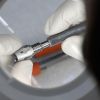The future: medicine 4.0
Healing and helping are the goals of medical action. Read here about how modern technology and digitization can contribute to these aims.

What is medicine 4.0?
Based on Industry 4.0, the term describes a fourth step forward in medicine. After the emergence of modern medicine 150 years ago, technologization in the form of X-ray machines and now digitization, robotics, networking and artificial intelligence found their way into medicine.
What does robotics do in medicine?
Robotics is the best known trend in medical technology. Robots are often used in medical operations. They hold instruments or make incisions – always controlled by doctors. Another area is artificial limbs and exoskeletons. Robots are also being developed for care and diagnostics.
What other developments are there?
Two broad areas: engineering and biotechnology. The first is primarily about miniaturization: microsystem technology, nanotechnology and optical technologies can be implanted. Biotechnology, cell and tissue technology are about molecularization, new biomaterials and organic three-D printing.
How do AI and Augmented Reality (AR) help?
An example: Petra is the name of an AI robot developed by the Darmstadt-based company Merck and Furhat Robotics of Sweden, which can detect the three most common diseases worldwide: hypothyroidism, alcoholism and prediabetes. Other systems assist doctors with diagnostics – AR because it affords special insights, AI because it can quickly analyse X-ray images.
Can networking be used in medicine?
The “digital twin” research project is one example. It’s being developed at the Innovation Centre for Computer-Assisted Surgery (Iccas) in Leipzig with the support of the German government. Through networking, the system will make all examination results, radiological images and other important patient data available to doctors anytime, anywhere.
Can apps help people who are ill?
Apps are already being used to help – for instance, Msense. The app from the Berlin start-up Newsenselab collects data and analyses the conditions under which headaches and migraines occur. It’s paid for by the health insurance companies. Other apps evaluate the data from implanted sensors and derive from it behavioural recommendations.
You would like to receive regular information about Germany? Subscribe here:


